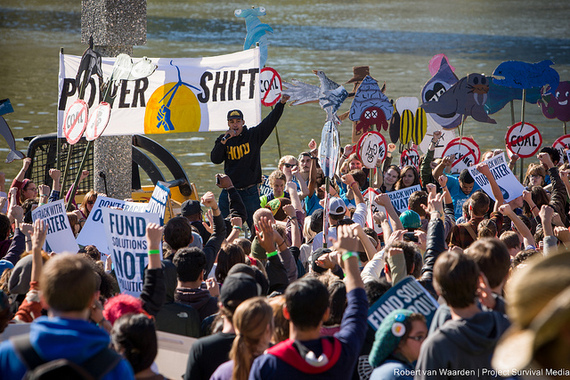Commencement season is in full swing, and graduation speakers are offering advice from podiums across the country. Some use humor, some share hard-won truths, and all urge graduates to embrace the future that lies ahead. That is good advice, but as a member of the baby boomer generation, I feel compelled to point out the elephant under the graduation tent: If America doesn't tackle the threat of climate change, the future looks grim.
Young people have a front-row seat on that future. They know climate change could limit their horizons and undermine their opportunities. When I left school, I never wondered whether my apartment in New York was vulnerable to storm surges, but my three daughters have to consider the realities of extreme weather and how it may destabilize communities around the globe. Yet like so many members of their generation, they are committed to fighting the climate threat.
Luckily these efforts are about to get a major boost. On Monday, the United States will take the single most important step it can to address climate change right now.
The Environmental Protection Agency will release the first national limits on carbon pollution from existing power plants. Power plants kick out 40 percent of the carbon pollution in our country, and yet astonishingly there are no limits on how much carbon they can dump into our atmosphere.
The EPA's action will change that. The details of the agency's proposal aren't available yet, but NRDC found that the US could reduce carbon pollution from power plants by up to 30 percent by 2020 using energy efficiency, wind and solar power, and other already available solutions. This would be a major dent in U.S. emissions -- equivalent to removing as many as 130 million cars from the road every year.
The EPA can move forward with these carbon limits right now, thanks to the Clean Air Act. It doesn't have to wait for Congress to wake up to the danger of climate change. But big polluters are already fighting them, using their deep pockets to attack carbon limits in court, statehouses, and Capitol Hill.
It's as if fossil fuel companies are looking young people in the eye and saying: "We don't care if you have a better future. We want to keep polluting the air and destabilizing the climate."
We have to fight back. We have to raise our voices and drown out the polluters.
Only a groundswell of support can combat the influence of fossil fuel companies. I urge you to join the call. Click here to tell the EPA you want strong carbon limits. Call your Members of Congress. And tweet and Facebook about it so your friends and family do the same. These actions matter: they let leaders know we want to hold carbon polluters accountable.
Young people are already leading on climate action. I see it at rallies to reject the Keystone XL dirty tar sands pipeline. I see it in the push to demand justice for communities being run over by fracking operations. I see it in the movement to encourage universities and other institutions to divest from fossil fuels. And I see it in the effort to prompt the American College and University Presidents' Climate Commitment sign on to a letter supporting the EPA's carbon limits on behalf of 684 schools.
Now it's time to throw some of that energy behind strong carbon limits for power plants. Together with other climate solutions, these limits will move our nation closer to the cleaner, more sustainable future your generation deserves.
Photo credit: Robert van Waarden, Project Survival Media

